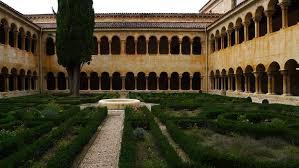cloister

n. 回廊;修道院;修道院生活;隐居地
vt. 使与尘世隔绝;用回廊环绕
n.
(学院、修道院、教堂等建筑的)走廊;回廊;修道院的生活;隐居
vt.
隐退,使与世隔绝;
变形
复数:cloisters过去式:cloistered过去分词:cloistered现在分词:cloistering第三人称单数:cloisters
英英释义
cloister[ 'klɔistə ]
n.
residence that is a place of religious seclusion (such as a monastery)
同义词:religious residence
a courtyard with covered walks (as in religious institutions)
v.
surround with a cloister, as of a garden
seclude from the world in or as if in a cloister
"She cloistered herself in the office"
双语例句
用作名词(n.)
The nuns live in a cloister of calm.
修女们住在一个幽静的修道院里。
He coiled around the moist cloister pillars.
他环抱着回廊那潮湿的柱子。
权威例句
Crisis in a CloisterCourt, Cloister, and City: The Art and Culture of Central Europe, 1450–1800
PROMOTION OF PRIMARY PRODUCTS — A VIEW FROM THE CLOISTER *
The Organization and Administration of the Cloister in Ancient Babylonia
CENOBIUM - Putting together the Romanesque Cloister Capitals of the Mediterranean Region
Women in Frankish Society: Marriage and the Cloister, 500 to 900 by Suzanne Fonay Wemple
Sacred Landscape and the Early Medieval European Cloister. Unity, Paradise, and the Cosmic Mountain
Stone decay induced by fire on historic buildings: the case of the cloister of Lisbon Cathedral (Portugal)
Preservation strategies for avoidance of salt crystallisation in El Paular Monastery cloister, Madrid, Spain
Differential effects of biocide treatments on saxicolous communities: Case study of the Segovia cathedral cloister (Spain)
cloister
cloister: [13] A cloister was originally simply an enclosed place, a ‘close’. The word comes from Old French cloistre, a descendant of Latin claustrum ‘bar, bolt, enclosure’, which was formed from the past participial stem of Latin claudere ‘close’ (source of English close). The notion of ‘enclosure’ led to the word’s being applied to a place of religious seclusion, such as a monastery or convent, and hence to a covered walkway within a monastic building. It also lies behind claustrophobia [19], which was formed from Latin claustrum.=> claustrophobia, close
cloister (n.)
early 13c., from Old French cloistre "monastery, convent; enclosure" (12c., Modern French cloître), from Medieval Latin claustrum "portion of monastery closed off to laity," from Latin claustrum (usually in plural, claustra) "place shut in, enclosure; bar, bolt, means of shutting in," from past participle stem of claudere (see close (v.)). "The original purpose of cloisters was to afford a place in which the monks could take exercise and recreation" [Century Dictionary]. Spelling in French influenced by cloison "partition." Old English had clustor, clauster in the sense "prison, lock, barrier," directly from Latin, and compare, from the same source, Dutch klooster, German Kloster, Polish klasztor.
cloister (v.)
c. 1400 (implied in cloistered), from cloister (n.). Figurative use from c. 1600. Related: Cloistered; cloistering.
1. pravrajana; cloister
出家
-- 来源 -- 汉英 - 翻译参考
2. the cloister
修道院生活,隐居
-- 来源 -- 英汉 - 短句参考
3. Of, relating to, or suggesting a cloister; secluded.
修道院的修道院的、与之相关的或指修道院的;隔离的
-- 来源 -- 英汉 - 短句参考
4. The nuns live in a cloister of calm.
修女们住在一个幽静的修道院里。
-- 来源 -- 轻轻松松背单词-蒋刚
5. Abbey; cloister; monastery
修道院
-- 来源 -- 英汉 - 翻译样例 - 单位
6. To furnish(a building)with a cloister.
设回廊于用回廊装饰(一幢建筑)
-- 来源 -- 英汉 - 短句参考
7. Living in a cloister.
隐居的住在修道院里的
-- 来源 -- 英汉 - 短句参考
8. surround with a cloister, as of a garden.
用回廊环绕,例如花园。
-- 来源 -- 汉英 - 翻译参考
9. the calm of the cloister
修道院的幽静.
-- 来源 -- 汉英 - 翻译参考
10. A covered place for walking, as in a cloister.
回廊,步道有顶棚的散步处,如回廊
-- 来源 -- 英汉 - 短句参考
